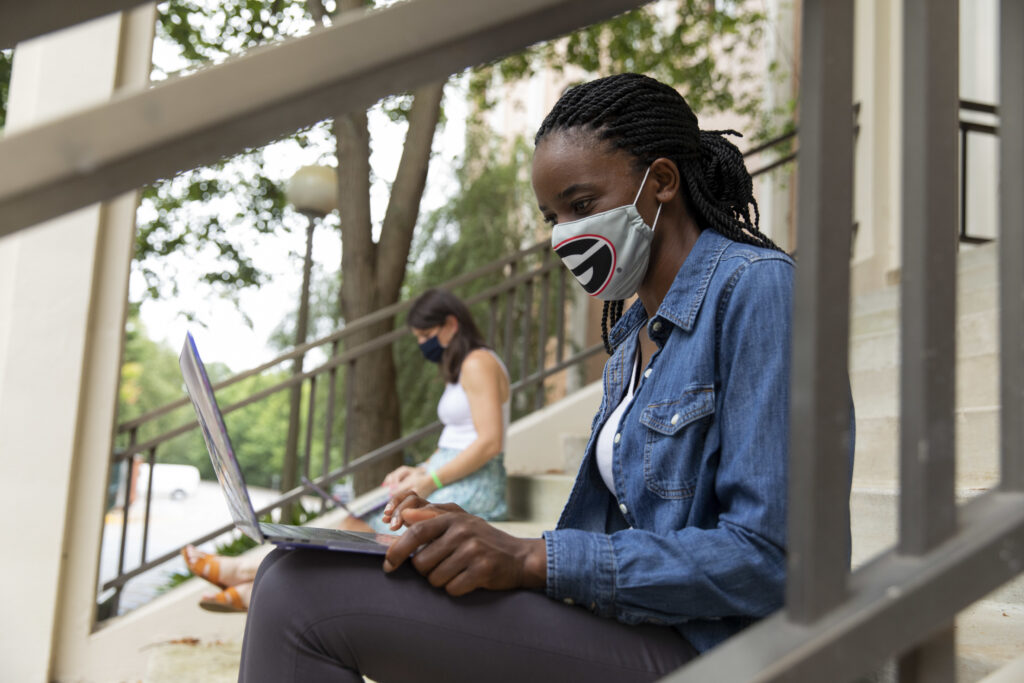For the third year, the Provost’s Affordable Course Materials Grant program will help save students money on course materials, enhance the quality of their learning experience in the classroom and increase their opportunities for success.
This semester, 13 faculty members in nine schools and colleges received funding through the program to transition from costly textbooks to open and affordable educational resources. A total of $60,000 was distributed through the program, including $10,000 in private support. The grant program is expected to save students more than $155,000 in textbook costs per academic year. Combined with the results of the first two rounds of funding, the annual savings to students exceeds $1.45 million.
“The Affordable Course Materials Grant program represents an important investment in the success of our students,” said S. Jack Hu, the university’s senior vice president for academic affairs and provost. “Through this program, our faculty are reducing costs for students while also improving the quality of their education.”
Proposals for Affordable Course Materials Grants were evaluated for impact, which includes dollars saved per student and the size of the student population that would benefit, and sustainability of the project.
Thomas Kadri, assistant professor of law, teaches torts, a single semester course required of all first-year law students. Traditionally, his class of approximately 60 students has had to purchase expensive casebooks that focus heavily on cases and legal standards. Collectively, they spend up to $17,000 annually on the casebook alone.
“My goal is to produce a course pack that is more customizable to the students’ needs, both educational and financial,” said Kadri. “I will also write my own notes and practice problems to give context to the cases and facilitate classroom discussion.”
Kadri plans to apply a Creative Commons license to the course pack to share with other instructors, which would allow them to customize it as needed. Beyond the financial aspect, Kadri’s easily accessed online resource will be available for students to use and review after finishing the torts course, helping strengthen and reinforce their education.
Jennifer Gay, associate professor in the College of Public Health, like Kadri, has encountered the issue of her students being unable to retain book content for future reference and application. This grant program will allow Gay’s students, who normally rent books, to have open access master’s-level educational resources containing course readings and learning activities from the current textbook.
“Many master’s students in the College of Public Health work part-time or full-time jobs while attending school and do not often qualify for financial assistance,” said Gay. “Reducing the materials cost burden for the health promotion research methods course contributes to our college’s mission and strategic plan by creating a more equitable learning environment.”

Grant funding will support Simon Platt’s creation of an e-book focusing on clinical neurology cases, patient imaging, patient test results and pathology. This will create a more holistic and visual learning experience for his students. (File photo)
Simon Platt, Renee Barber and Marc Kent, all faculty in the College of Veterinary Medicine, will create e-books for their students. All three veterinary neurologists teach courses on small animal clinical neurology and veterinary neuroanatomy and physiology. These electronic books will include animations and videos to create a holistic and practical visual learning experience for students. Collectively, these e-book projects will save veterinary medicine students over $77,000 per year.
“It has been repeatedly demonstrated that students increase their achievement when varied, multi-sensory methods are used as a form of instruction,” said Platt. “The gap between the currently required textbook information and the format of the information required to be successful on the senior clinical veterinary rotations needs to be bridged.
Xiaoming Zhai, assistant professor in the Mary Frances Early College of Education, teaches introduction to research in science education. He has found that even when using the two assigned textbooks, the content is often insufficient to meet the needs of his students. “The examples in the textbooks are seldom associated with science education, which increases the challenge for students to comprehend the methods,” said Zhai.
With his grant, Zhai plans to transform his class using interactive videos with embedded course activities and quizzes. This new digital content, which will save Zhai’s students up to $5,000 per year, will also include research examples from science education so that students will better understand the methods within a specific context.
The Provost’s Affordable Course Materials Grant program complements the Textbook Transformation Grants program that is sponsored by the Affordable Learning Georgia initiative of the University System of Georgia. Since fiscal year 2014-2015, the ALG’s funding of the Textbook Transformation Grants has saved $69.2 million and reached 417,169 USG student enrollments. Affordable Learning Georgia’s open educational resource materials are currently in a transition from GALILEO Open Learning Materials to OpenALG. This transition will allow materials to be more accessible, interactive and engaging for students.
Research has shown that OERs improve the performance of students and decrease their drop, fail and withdrawal rates. These resources typically reduce access barriers for students and ensure that all students can have access to educational materials regardless of their financial status.
“The success of the Affordable Course Materials Grant program highlights the commitment of the university and the faculty to reducing financial barriers for our students,” said Michelle Cook, vice provost for diversity and inclusion and strategic university initiatives. “The program affirms our values of equity and inclusion across the educational enterprise.”
The Provost’s Affordable Course Materials Grant program is administered by the UGA Libraries and the Center for Teaching and Learning, both of which offer information and consulting to faculty interested in open and affordable educational resources. In addition, UGA Libraries recently halted the collection of late fees from students to further increase access to learning materials. This change is expected to save students approximately $25,000 per year.
The 2021 Affordable Course Materials Grant recipients are:
- Renee Barber, assistant professor, department of small animal medicine and surgery, College of Veterinary Medicine
- Michael Barger, assistant professor, department of educational psychology, Mary Frances Early College of Education
- Jennifer Gay, associate professor, department of health promotion and behavior, College of Public Health
- Jessica Heywood, clinical associate professor, School of Law
- Thomas Kadri, assistant professor, School of Law
- Marc Kent, professor, department of small animal medicine and surgery, College of Veterinary Medicine
- William Kisaalita, University Professor and UGA Athletic Association Distinguished Professor in Engineering, School of Chemical, Materials, and Biomedical Engineering, College of Engineering
- Rielle Navitski, associate professor, department of theatre and film studies, Franklin College of Arts and Sciences
- Svoboda Pennisi, professor, department of horticulture, College of Agricultural and Environmental Sciences
- Craig Piercy, director, Master of Business and Technology program, department of management information systems, Terry College of Business
- Simon Platt, professor, department of small animal medicine and surgery, College of Veterinary Medicine
- Gulcan Saglam, lecturer, department of international affairs, School of Public and International Affairs
- Jill Stefaniak, assistant professor, department of career and information studies, Mary Frances Early College of Education
- Xiaoming Zhai, assistant professor, department of mathematics and science education, Mary Frances Early College of Education
